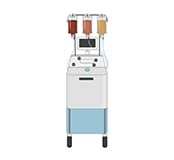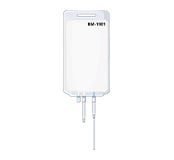"Patients meeting any of the following criteria will not be eligible to participate in this study:
[1] A history of other cancers (excluding papillary thyroid cancer, skin cancer, or breast carcinoma in situ);
[2] Participation in another drug trial within the last 4 weeks;
[3] Chronic unhealed wounds or fractures in the chest or elsewhere;
[4] A history of substance abuse involving psychotropic drugs or an inability to quit, or a history of mental illness;
[5] Documented evidence of lung conditions such as pulmonary fibrosis, interstitial pneumonia, pneumoconiosis, radiation pneumonitis, drug-induced
pneumonitis, or severe lung dysfunction;
[6] Active infections requiring antibiotics, except for simple urinary tract infections or uncomplicated bacterial pharyngitis, as approved by the investigator;
[7] For patients with prior chemotherapy, hematologic toxicity of Grade 2 or higher, or non-hematologic toxicity of Grade 3 or higher, per NCI-CTCAE 4.0 at the time of enrollment;
[8] Known HIV infection, hepatitis B (HBsAg positive), or hepatitis C (anti-HCV positive with detectable viral load);
[9] Use of indwelling catheters or drainage tubes (e.g., bile drainage or pleural/peritoneal/pericardial catheters). Central venous catheters are permitted, while other devices (e.g., ostomy, nephrostomy tubes, or Foley catheters) will be assessed by the investigator for eligibility;
[10] Brain metastases, unless stable following radiotherapy or other treatments;
[11] A history of central nervous system (CNS) disorders, such as seizures, stroke, dementia, cerebellar disease, or autoimmune conditions affecting the CNS;
[12] Significant immune deficiency;
[13] A history of severe allergic reactions to key study medications (e.g., leukocyte-boosting agents, tocilizumab for cytokine release syndrome prevention, or anti-infective drugs);
[14] A history of deep vein thrombosis or pulmonary embolism within the last 6 months;
[15] Autoimmune diseases (e.g., Crohn’s disease, rheumatoid arthritis, or lupus) within the past 2 years that caused organ damage or required immunosuppressive therapy;
[16] Any condition that could compromise the safety or effectiveness of the study treatment;
[17] Other factors that, in the investigator’s judgment, make the patient unsuitable for the study."



